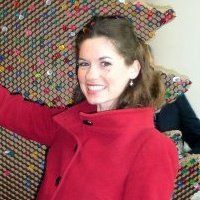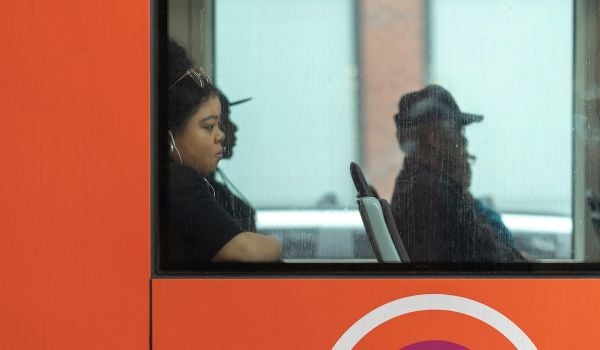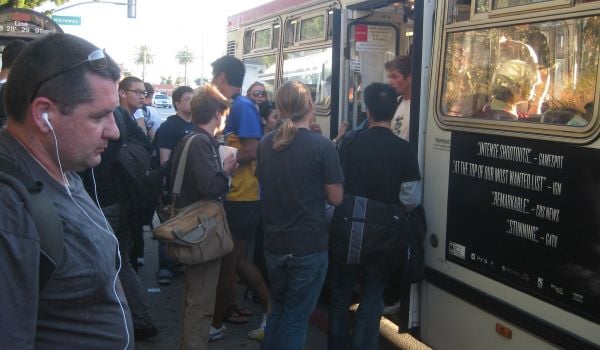Next American Vanguard is the only annual conference dedicated to enlightening, inspiring and networking the next generation of urban leaders. For two days in May 2009 and 2010, two such groups of leaders had the opportunity to network with each other, engage with experts in their field, hear from seasoned changemakers and jumpstart their ideas for improving cities. But the Vanguard’s work continues year-round in the government offices, nonprofits, corporations and communities they work in. Each Monday leading up to the 2011 conference, which will take place in May, we will feature an interview with a member of the Vanguard. To read more of these interviews, click here. To learn more about eligibility, click here (the application period will begin in early 2011). To read a recap of the 2010 event, click here.
Katie Drennan is the Deputy Legislative Director of Transportation for America, a nonprofit organization dedicated to transportation reform. T4America is a broad coalition including partners in housing, business, environmental, public health, transportation, equitable development and other organizations. It seeks to align national, state and local transportation policies with an array of issues like economic opportunity, climate change, energy security, health, housing and community development.
What is your typical workday like?
A lot of my work is beholden to the Congressional calendar, as well as their agenda. My typical day would include meetings on the Hill with legislative staff advocating for better land-use and transportation policy, creating legislative strategy for pushing bills we support, and giving direction to our 500+ state and local partners in the field on how to engage and push their Congressional leaders to move toward a more clean, multimodal transportation system.
Why do you do the work you do?
I believe that our transportation systems affect nearly every part of our lives. Done well, they create communities where everyone is able to get around regardless of age or ability. Good transportation policy creates access to opportunities, healthy lifestyles, preserves open space and gives people options of how they get where they need to go. Done poorly, transportation policy also has the ability to encourage sprawl and auto dependence.
What is your proudest achievement?
While working on Capitol Hill I worked on a piece of legislation called the “Higher Education Sustainability Act”, which set standards for college and university programs focused on sustainability. There currently are no standards or uniformity across programs which made it difficult for students to decide where to study, and for employers to know what skills their graduates brought to the job. Working with Universities and stakeholders we passed the bill in the House, which sets the stage for greater clarity and credibility for sustainability programs. The more we can incorporate sustainability curriculum into undergraduate and graduate programs, the better!
Who in your city inspires you the most?
My former boss, Congressman Earl Blumenauer, inspired my initial interest in land use and transportation policy and continues to inspire me today. He’s been nicknamed the “Johnny Appleseed of Livability” and was pivotal in creating the urban growth boundary in Portland decades ago. He’s always been a visionary and has helped other Congressional Members develop their own “shade of green”. His constant commitment to making communities more livable through good policy is a wonderful example for young people everywhere.
What is your favorite thing to do in your city?
I love to play soccer, run and ride my bike; it’s always surreal to watch the sun rise on the Washington Monument or the Lincoln Memorial. I also live near a wonderful farmers market so I like to try cooking new recipes and checking out new restaurants using locally sourced ingredients.
What leaders, thinkers or doers do you admire most?
As I mentioned above, I’m very interested in food and how our national policies are affecting the health of our land and our bodies. I’ve read most of Michael Pollan’s work and love the way he really breaks down the farm to table chain. For general urban policy, I love what they do at the Brookings Institute, especially Bruce Katz at the Metropolitan Policy Program. They publish great work, put on fascinating lectures, and serve as a credible source on progressive urban policies.
What is the biggest challenge of your work?
Convincing policymakers that it is in the federal interest to create policies that encourage good land use policy. Many purport that setting such policies is akin to socialism or behavior modification. On the contrary, the federal government has been subsidizing certain behavior and building models for decades, and it’s why many of our cities have sprawled the way they have and why we’re so dependent on foreign oil. However, one of the best things in my work is when you work with great Legislators and their staff who recognize that smart planning investments reap major rewards for communities of all sizes and geographies.
What would you like to have achieved in ten years?
What a question! I would like to be working back in my hometown of Portland, Oregon continuing to bring sustainable development and jobs to the city. I love transportation and urban planning, but I’m also very interested in how to attract businesses and companies to a city in a way that’s good for the community. A great city has great employers that provide living wage jobs, offer services and goods that improve their community, and give back to the area they work in. I’d love to be doing something that combines these interests to make Portland the greatest city in America!
What would be your advice to young people who want to make a difference in their cities?
There are so many ways to get involved! There are many volunteer opportunities with non-profits, and internships are great for those looking to pursue professions in the “urban arena”. I think you just need to pick up the phone and get in touch with someone who is working in the area you’re interested in and see where there is room to get involved.
How would you define the “Next American City”?
I think there is a real revolution happening right now in terms of returning to more human-scale development. I think the next American city is walkable, full of mixed-use developments, incorporates green spaces and urban farming, provides transportation options for all and has a strong sense of place.




_600_350_80_s_c1.jpg)











